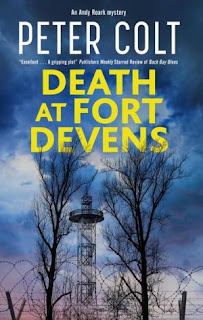Vicki Delany is one of Canada’s most prolific and varied crime writers and a national bestseller in the U.S. She has written more than forty-five books:

clever cozies to Gothic thrillers to gritty police procedurals, to historical fiction and novellas for adult literacy. She is currently writing four cozy mystery series: the Catskill Summer Resort mysteries for Penguin Random House, the Tea by the Sea mysteries for Kensington, the Sherlock Holmes Bookshop series for Crooked Lane Books, and the Lighthouse Library series (as Eva Gates) for Crooked Lane.
Delany is a past president of the Crime Writers of Canada and co-founder and organizer of the Women Killing It Crime Writing Festival. Her work has been nominated for the Derringer, the Bony Blithe, the Ontario Library Association Golden Oak, and the Arthur Ellis Awards. Delany is the recipient of the 2019 Derrick Murdoch Award for contributions to Canadian crime writing. She lives in Prince Edward County, Ontario.
Delany's newest book (as Eva Gates) is the Lighthouse Library mystery,
Death By Beach Read.
Recently I asked the author about what she was reading. Delany's reply:
I’ve recently been on a couple of ultra long flights. I love long flights: I find that these days its about the only time I can seriously get into a book without constant interruptions.
Here’s a glimpse at what I’ve been reading on all these flights.

Going to Beautiful by Anthony Bidulka. I picked this up because Tony’s a good friend of mine. He used to write a hilarious series of globetrotting PI novels that I loved, but he’s been quiet lately, in his writing life anyway. So I was excited to find something new and picked up Going to Beautiful. I enjoyed it very much. It’s a beautifully written, gentle, often hilarious, always poignant book about a grieving man finding community and acceptance in small town Saskatchewan, where he is most definitely a fish out of water. There is a mystery component, which is what brings the protagonist to the small town, but it is a minor part of the book. Highly recommended.
How to Stop Time by Matt Haig. English writer Matt Haig is what I might call a ‘quirky’ writer. His plots are substantially out of the  ordinary. This book is about a man who has a far longer life span than normal - he was born in the 16th century and is now only in middle-age. The book jumps around in time, but he is not a time-traveller. His life is as linear as the rest of us. The book’s light and funny and makes us think seriously about what we’d do with that sort of time, and if it would be worth it to live so much longer than everyone you’ve ever loved. The book is now in production as a movie with Benedict Cumberbatch and I can’t wait!
ordinary. This book is about a man who has a far longer life span than normal - he was born in the 16th century and is now only in middle-age. The book jumps around in time, but he is not a time-traveller. His life is as linear as the rest of us. The book’s light and funny and makes us think seriously about what we’d do with that sort of time, and if it would be worth it to live so much longer than everyone you’ve ever loved. The book is now in production as a movie with Benedict Cumberbatch and I can’t wait!
The Radleys by Matt Haig. Talk about quirky: The Radleys are vampires living in middle-class England and trying to appear as average as everyone else. I can’t say I liked it as much as How to Stop Time but the premise is  interesting and it’s well done. The parents have concealed from their two children that they are vampires, but when the daughter declares that she’s going to be a vegan, they realize they have a problem. How would you like to be a bullied teenage boy, discovering that you’re a real vampire?
interesting and it’s well done. The parents have concealed from their two children that they are vampires, but when the daughter declares that she’s going to be a vegan, they realize they have a problem. How would you like to be a bullied teenage boy, discovering that you’re a real vampire?
Woman on the Edge by Samantha Bailey. Domestic suspense is all the rage these days and, as is typical with books that are ‘in’, quality varies widely. At first glance this book seems to be one of a endless variations on a theme of an ordinary woman suddenly thrust into danger, with no idea what’s going on, but Bailey pulls it off with an intricate plot that is expertly done and plenty of suspense.
Follow
Eva Gates on Twitter and visit
Vicki Delany's website.
The Page 69 Test: Death By Beach Read.
--Marshal Zeringue
 nominated for the Mary Higgins Clark Award and named the Dogwise Book of the Year. The sequel Blind Search, inspired by the real-life rescue of a little boy with autism who got lost in the woods, was followed by The Hiding Place in 2021.
nominated for the Mary Higgins Clark Award and named the Dogwise Book of the Year. The sequel Blind Search, inspired by the real-life rescue of a little boy with autism who got lost in the woods, was followed by The Hiding Place in 2021.
enlightening. Roach takes us on a trip around the world, to the places where wildlife and humankind overlap—and not in a good way. You meet marauding elephants in India, “nuisance” bears in Aspen, ruinous gulls in Vatican City—and no matter what the offense, you find yourself rooting for the wildlife. At least I did.
do most all of Griffiths’ work. And I’ll read it at least one more time, this time as a writer rather than reader, because our best writing teachers are our betters.




























